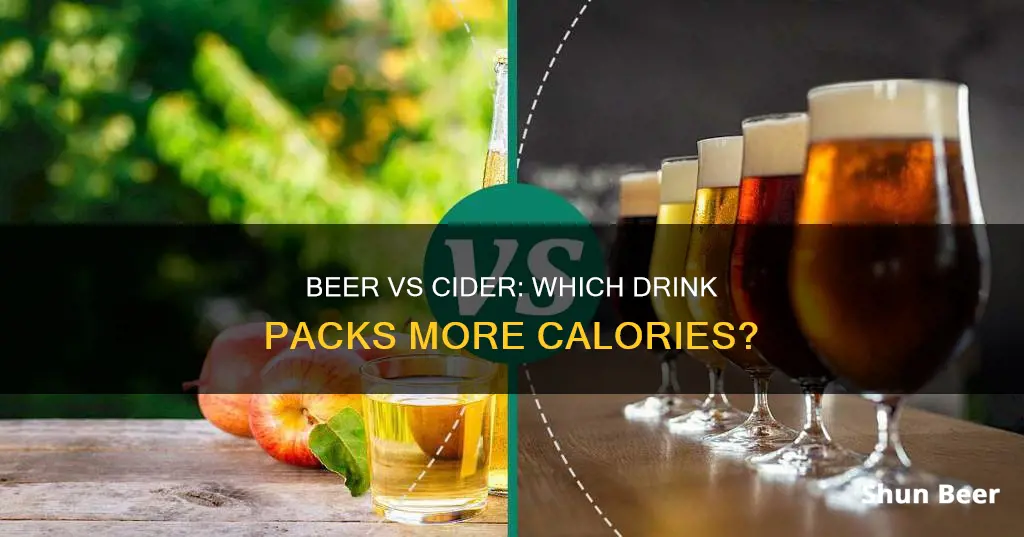
Beer or cider? It's a question that's been asked by many a punter at the bar, but which drink has the most calories? Well, it's complicated. The number of calories in a drink depends on the alcohol percentage and the sugar or carbohydrate content. Generally, cider has more sugar and carbohydrates than beer, but the calorie difference between the two drinks is relatively small. On average, a pint of cider contains 215 calories, while a pint of beer contains 182 calories. However, a higher-ABV beer, such as ale or stout, can contain 250 calories or more. So, while cider usually has more calories than beer, there are exceptions.
| Characteristics | Values |
|---|---|
| Calories per 100g | Beer: 43 kcal |
| Cider: 46-56 kcal | |
| Calories per 12oz bottle | Beer: 121-168 kcal |
| Cider: 129-190 kcal | |
| Carbohydrates | Beer: 3.55-3.6g/100g |
| Cider: 5.92-11.3g/100g | |
| Water | Beer: 91.96g/100g |
| Cider: 89g/100g | |
| Vitamins | Beer: High in B vitamins, contains some vitamin E |
| Cider: Contains vitamin C and some B vitamins | |
| Sugar | Beer: Low sugar |
| Cider: High sugar | |
| Antioxidants | Beer: Contains flavonoids |
| Cider: Contains polyphenols and flavonoids |
What You'll Learn

Beer has fewer calories than cider
When it comes to calories, beer and cider are not created equal. While both drinks contain similar amounts of alcohol, the number of calories in a beer or a cider can vary depending on the style and brand. That being said, beer typically has fewer calories than cider.
On average, beer has 43 calories per 100 grams, while cider contains 56 calories per 100 grams. This means that cider has approximately 30% more calories than beer. The higher calorie content in cider is due to the higher amount of carbohydrates, or carbs, present in the drink. Cider has 67% more carbs than beer, with 5.92 grams of carbohydrates per 100 grams compared to 3.55 grams in beer.
The difference in calorie content between beer and cider becomes even more apparent when comparing specific brands. For example, a 12-ounce bottle of Wisconsin's favorite beer, Spotted Cow, contains 150 calories, while a similar-sized serving of Angry Orchard Crisp Apple cider contains 190 calories. This is because, in addition to alcohol, fermented beverages like beer and cider contain residual carbohydrates that contribute to their overall calorie count.
However, it is important to note that the calorie content of beer and cider can vary depending on the specific type and brand. For instance, a fully fermented dry cider will contain no sugar and, therefore, have fewer calories than a commercial cider, which often contains added sugar. Similarly, breweries can create lighter, lower-calorie beers by using more vigorous yeast strains and carefully selecting their grains to ensure a more complete fermentation that leaves fewer residual carbohydrates.
In summary, while both beer and cider can be part of a balanced diet when consumed in moderation, beer generally has fewer calories than cider due to its lower carbohydrate content. The specific calorie content of each drink will depend on various factors, including the brand, style, and fermentation process.
Air-Fried Beer-Battered Onion Rings: A Calorie Conundrum
You may want to see also

Cider has more carbohydrates
Cider typically has more carbohydrates than beer, which means it usually has a higher calorie count. The fermentation process is key to understanding why this is the case. Cider is made by fermenting fruit with sugar and yeast, and the most commonly used fruit is apples, which are naturally high in sugar. Beer, on the other hand, is made with yeast, hops, water, and cereals, which are low-sugar grains. While sugar is often added to beer to balance the flavour, the different fermentation processes result in cider usually having a higher number of carbohydrates.
The amount of sugar left in the cider depends on the type of cider. Sweeter ciders are slowly fermented, and the yeast consumes less of the cider's natural sugars. This results in a drink that is less sweet and has a higher alcohol content. Dry ciders, on the other hand, allow the yeast to consume most of the natural sugars, resulting in a less sweet drink with a higher alcohol content. However, because alcohol has more calories per gram than sugar, this process can result in a higher overall calorie count.
The calorie count in cider or beer depends on two things: the levels of alcohol and the amount of sugar or carbohydrates. Alcohol has 7 calories per gram, compared to 4 calories per gram for carbohydrates. So, the higher the percentage of alcohol, the more calories the drink will have. This means that the ABV (alcohol by volume) of the drink is often the biggest factor in the total number of calories.
While beer typically has fewer calories than cider, the difference is not always significant. A bottle of beer and a bottle of hard cider can have a similar number of calories, with both drinks containing around 200 calories. The specific brands and types of beer and cider can also make a difference. For example, a 500ml bottle of Strongbow Original Cider has 175 calories, while a 500ml bottle of Rekorderlig Strawberry & Lime has 330 calories.
In terms of overall health, it's important to consider not only the calorie and carbohydrate content but also the vitamins and minerals found in these drinks. Both beer and cider contain nutrients and have some health benefits. Beer is rich in vitamins and minerals, including magnesium, potassium, and B vitamins. Cider is also nutrient-rich, containing pectin, B vitamins, biotin, folic acid, and vitamin C. Additionally, cider contains polyphenols, natural compounds that can improve blood pressure and cholesterol.
Calorie Count for O'Doul's Amber Beer Revealed
You may want to see also

Beer is not gluten-free
Beer and cider are two of the most popular alcoholic beverages in the world. While beer is America's most beloved alcoholic drink, cider is the drink of choice for an increasing number of Americans. Cider is also the second most popular alcoholic beverage in the UK, after beer.
When it comes to calories, a bottle of beer and one of hard cider have a similar number of calories—around 200. However, ciders are typically higher in carbohydrates due to higher amounts of sugar. On average, they will be slightly higher in calories and carbs than beer.
Now, is beer gluten-free? The answer is no. Conventional beer is not gluten-free. Beer is typically made from a combination of malted barley and hops, and sometimes wheat is also used in the beer-making process. Since barley and wheat contain gluten, beers made from either of these grains are not gluten-free.
People with gluten sensitivities and allergies cannot comfortably or safely consume food products that contain gluten. In response, gluten-free alternatives have been popping up more frequently. A few breweries have started brewing gluten-free or gluten-reduced beers to cater to those with gluten sensitivities.
Gluten-free beer never uses a gluten source. When brewing gluten-free beer, barley is swapped out for another carbohydrate source that doesn't contain gluten, like buckwheat, rice, corn, or millet. Because they never contained any gluten during the brewing process, gluten-free beers contain 0 parts per million of gluten.
Gluten-reduced beers, on the other hand, contain less than 20 parts per million of gluten. They are made like any other typical beer, but an enzyme is added later to break down the gluten. This process helps make the beer safer for consumption by people with gluten sensitivities. However, people with high gluten sensitivity or celiac disease may still react to the small amount of gluten present.
To prevent cross-contamination, gluten-free or gluten-reduced beers must be produced before any "regular" beers in the brewery setting. All tanks and equipment must be tested for gluten to confirm low enough levels. This process adds a lot of extra steps, time, and money, which is why gluten-free and gluten-reduced beers are not more common.
In summary, beer is not gluten-free. However, there are gluten-free and gluten-reduced options available for those who want to enjoy a beer without the gluten.
Rolling Rock Beer: Carb and Calorie Breakdown
You may want to see also

Cider has more vitamin C
When it comes to the age-old debate of beer versus cider, there are a few key differences to consider. While both drinks have their own unique characteristics and appeal, one area where cider takes the lead is in its vitamin C content.
Cider, especially hard cider or apple cider, is known for its high vitamin C content. Vitamin C, also known as ascorbic acid, is a water-soluble vitamin that plays a crucial role in various bodily functions. It is a powerful antioxidant, helping to protect our bodies from the damaging effects of free radicals. This makes it an important nutrient for boosting our immune systems, promoting healthy skin, and aiding in the absorption of iron from plant-based sources.
The presence of vitamin C in cider is due to the fact that it is typically made from apples, which are a good source of this vitamin. Apples are packed with nutrients and offer numerous health benefits, including providing a good amount of dietary fibre, which can aid in digestion and lower cholesterol levels. The fermentation process involved in making cider may reduce the overall vitamin C content compared to fresh apples, but it still retains a significant amount.
On the other hand, beer typically does not contain vitamin C. Beer is usually made from a combination of water, wheat or barley, fermenting yeast, and flavouring agents like hops. While beer offers its own set of nutrients, including vitamins and minerals such as magnesium, potassium, and B vitamins, it falls short when it comes to vitamin C.
So, if you're looking for a drink that provides a boost of vitamin C, cider is the clear winner between the two. However, it's important to remember that both drinks have their own unique nutritional profiles, and the decision to choose one over the other depends on various factors, including personal preference, taste, and overall health considerations.
In conclusion, while beer and cider both have their merits, cider takes the lead when it comes to vitamin C content. This makes it a refreshing and nutritious option, especially for those looking to boost their intake of this essential vitamin.
Calories in Tropicalia Beer: A Nutritional Overview
You may want to see also

Beer has more B vitamins
When it comes to the question of which has more calories, beer or cider, the answer is not a straightforward one. The calorie content of beer and cider can vary depending on various factors, such as the specific type, brand, and ingredients used. However, in general, both drinks tend to have a similar calorie count, with a bottle of beer and one of cider containing around 200 calories on average.
Now, let's shift our focus to the statement "Beer has more B vitamins."
Beer has a reputation for being more than just an alcoholic beverage; it is often touted as a source of B vitamins, which are essential water-soluble nutrients. B-complex vitamins, including folic acid, niacin, riboflavin, and vitamin B-6, can be found in beer, with each serving providing between 5% and 10% of the daily recommended value. These vitamins are crucial for maintaining a healthy body as they help in energy production, disease prevention, and the health of red blood cells and the nervous system.
Compared to cider, beer stands out for its higher B-vitamin content. While cider also contains B vitamins, beer typically provides a more substantial amount. This is due to the fact that beer is made from cereal grains and yeast, which are rich sources of these specific vitamins.
However, it is important to remember that the alcohol content in beer can diminish the benefits of these vitamins. To truly reap the nutritional benefits of B vitamins, non-alcoholic or low-alcohol beers are a better option. Additionally, while beer may have a higher B-vitamin profile, cider has the advantage of being gluten-free and containing vitamin C, thanks to its fruit-based composition.
In conclusion, while beer may boast a higher content of B vitamins, it is important to consider the overall nutritional profile of both drinks, including their vitamin and mineral content, as well as their calorie and sugar content. Both drinks have their unique benefits, and making an informed choice involves understanding their specific attributes and how they align with individual preferences and health goals.
Calories in a Grapefruit Shandy Beer: A Nutritional Overview
You may want to see also
Frequently asked questions
Beer has 43 calories per 100 grams and cider has 56 calories per 100 grams, so cider has more calories.
Yes, the calorie content varies depending on the specific drink. For example, a typical beer will have additional calories from unfermented carbohydrates, whereas a dry cider will have fewer added calories.
Both drinks contain antioxidants and vitamins. Cider contains polyphenols, which can improve blood pressure and cholesterol, and beer contains bitter acids, which may aid digestion. However, it's important to remember that these drinks are not typically consumed for their health benefits, and excessive consumption can lead to adverse health effects.







